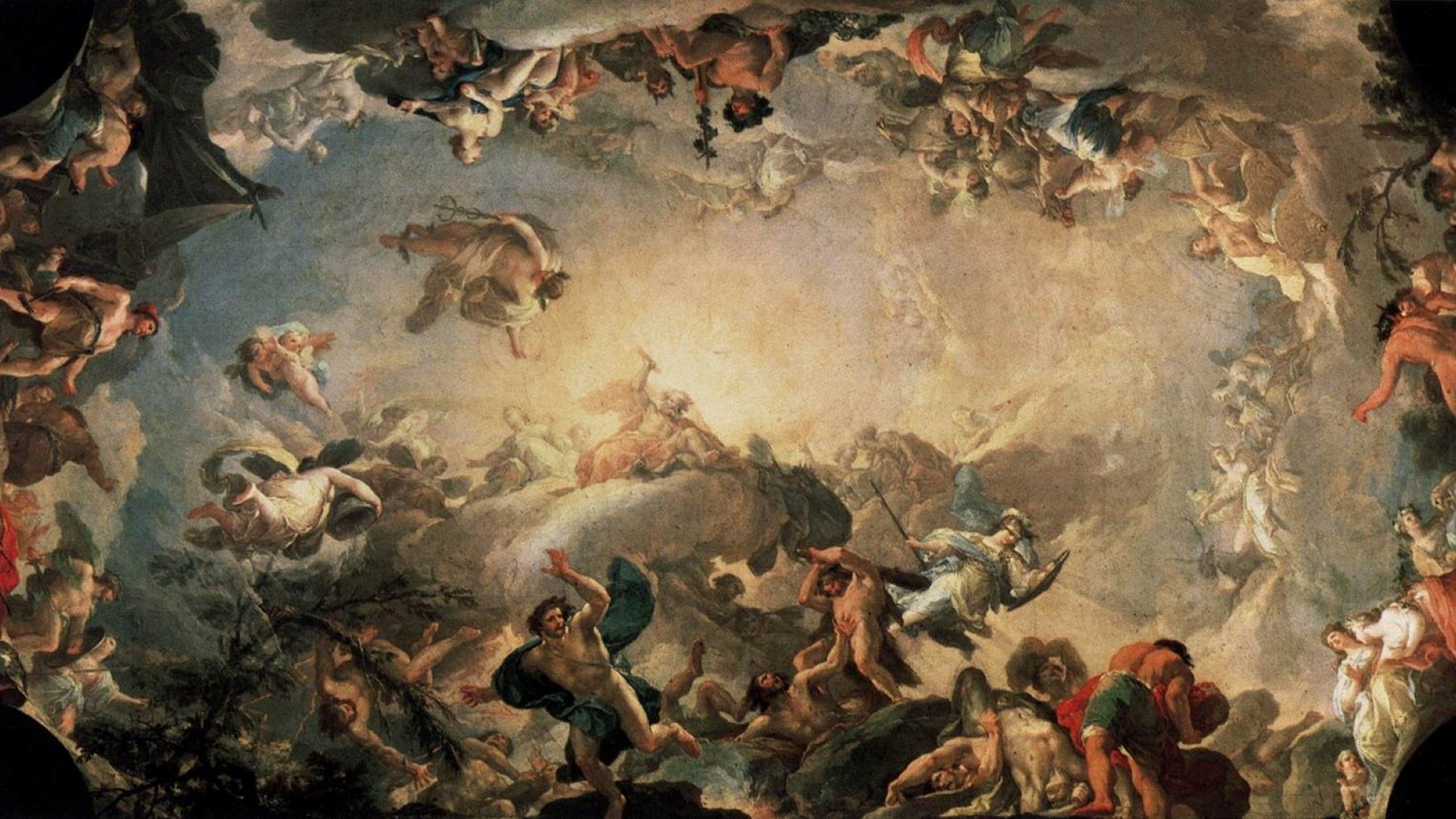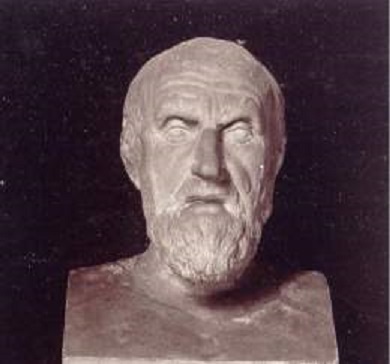
Xenocrates of Chalcedon

Xenocrates of Chalcedon (Greek: Ξενοκράτης; c. 396/5 – 314/3 BC[1]) of Chalcedon was a Greek philosopher, mathematician, and leader (scholarch) of the Platonic Academy from 339/8 to 314/3 BC. His teachings followed those of Plato, which he attempted to define more closely, often with mathematical elements. He distinguished three forms of being, the sensible, the intelligible, and a third compounded of the two, to which correspond respectively, sense, intellect and opinion. Unity and duality he considered to be gods which rule the universe, and the soul is a self-moving number. God pervades all things, and there are daemonical powers, intermediate between the divine and the mortal, which consist in conditions of the soul. He held that mathematical objects and the Platonic Ideas are identical, unlike Plato who distinguished them. In Ethics, he taught that virtue produces happiness, but that external goods can minister to it and enable it to effect its purpose.
Xenocrates was a student of Plato and, as head of the Academy from 339 b.c. to 314/313 b.c., was one of the founders of the ancient Academic tradition. He entered the Academy (in 378 b.c. at the earliest or 373 b.c. at the lastest) and about ten years laster accompanied Plato to Syracuse, the latter’s second or third voyage to that city.
After Plato’s death, Xenocrates and Aristotle were invited to Assos, where they remained until the overthrow of Hermias of Atarneus, in 342 b.c. Plato’s successor, his nephew Speusippus, headed the Academy until his death in 340/339 b.c. He sent for Xenocrates, who was not in Athens at this time, and designated him his successor. Nevertheless, an election was held, which Xenocrates won by only a few votes. The opposing candidates, Heraclitus Ponticus and Menedemus of Pyrrha, thereupon left the Academy. (Aristotle was not a candidate.)
In 322 b.c. Xenocrates was appointed to an Athenian legation sent to negotiate with Antipatrus of Macedonia, but it was compelled, instead, to acknowledge Athens’ submission. Since Xenocrates was not a citizen of Athens, Antipatrus did not recognize his status as a legitimate ambassador. Both before and after this incident, Xenocrates refused to seek Athenian citizenship, since he disapproved of the city’s close relations with Macedonia. On this point he was at odds with the political views of his predecessor Speusippus, who had supported Athens’ pro–Macedonian policies. After Xenocrates’ death, the leadership of the Academy passed to Polemo.
According to a number of less substantiated anecdotes about Xenocrates, he is depicted as good–natured, gentle, and considerate–but it is also quite clear that he lacked the charis (“graciousness”) of his teacher Plato. Along with these traits, Xenocrates is reported to have displayed singular diligence. The list of his writings, which is entirely preserved in Diogenes Laertius (IV, 11–14), contains about seventy titles. The biographical anecdotes state that he never left the Academy (where all his work was done) more than once a year.
None of Xenocrates’ writings has survived. They presumably were never published–that is, copied; rather, the single copies in his own hand were deposited at the Academy. When Athens was stormed by Sulla’s troops in March 86 b.c., the Academy, located in front of the western gate, was destroyed together with its priceless library.1
Unlike Aristotle, Xenocrates did not wish to develop philosophy in new ways but considered it his task to maintain Plato’s theory as he had received and understood it. This motivation underlay his extensive literary activity, in which enterprise Xenocrates relied primarily upon his memory-recalling, in some instances, what he had learned as much as twenty-five years earlier. Curiously, Xenocrates did not respect an important request made by Plato, who considered language unreliable and conducive to misunderstanding. Plato apparently insisted that the contents of philosophical doctrines be communicated only to those who would strictly observe definite precautions, and consequently he often veiled his meaning through the use of metaphors and myths. Xenocrates, seeking to render Plato’s theories teachable without recourse to such means, established a system of doctrinal propositions. Xenocrates’ lifework consisted in producing a kind of codification-and thus, of necessity, a transformation-of Plato’s philosophy. But it immediately became apparent that others, especially Aristotle, understood Plato in a wholly different way with respect to certain key questions. Crantor of Soil, for example-himself the pupil of Xenocrates-was to some extent justified in reproaching him for having taught things that differed from elements of Plato’s surviving written works. Although Xenocrates did not attribute to Plato anything that he had not actually taught, he did choose single aspects–often overly narrow ones–from among the many possible ways of presenting Plato’s conceptions and raised them to the status of official doctrine.
Xenocrates probably found himself confronted with a difficult situation. After it had been decided to preserve Plato’s teachings, everything that could not be encompassed in words–that is, everything that Plato had not wished to set forth in words–had to be abandoned in the interest of a clear and systematic presentation. In the process of achieving this sort of systematization, Xenocrates sacrificed Plato’s dialectical approach.
Xenocrates was no more a dualist than Plato. Rather, he belongs to the long line of those who have attempted to overcome a type of dualism within the philosophical tradition. In particular, in his comprehensive outline, Xenocrates provided for a gradation of all the elements that make up ontology, physics, ethics, and epistemology. This scheme assumed major importance in the development of Neoplatonism. Xenocrates’ real legacy lies in the conception he sketched of a hierarchy of all existing things that culminates in a single, highest point, the One.
Notes
1. Reports of Xenocrates’ teaching have survived only in the works of Aristotle and in Cicero and other Roman authors. The so–called fragments have been collected by Richard Heinze (see below). All knowledge of Xenocrates was probably based on an indirect tradition. Reports of his teaching are only rarely supported by mention of the title of one of his works (cf. Heinze, 157, 158). The only quotation that seems to bear the stamp of authenticity is in Themistius’ (A.D. 317[?]–ca. 388) commentary on Aristotle’s De anima; see Commentaria in Aristotelem Graeca, V, pt. 3, R. Heinze. ed. (Berlin, 1899); and Heinze, Xenocrates, frag, 61 In Themistius’ reference to the fifth book of περί Φύσεωѕ it is possible to glean an indication that Xenocrates may have introduced the definition of soul as number. In this insteance it cannot be ruled out that περί Φύσεωѕ had been published either in whole or in part. But such a quotation may also have originated in Crantor’s interpretation of the Timaeus. where he suddenly attacks Xenocrates’ theory of the soul as number. On this point, see H. F. Cherniss, Aristotle’s Criticism of Plato and the Academy, I (Baltimore, 1944; repr. New York, 1962). P. 399, n. 325.
BIBLIOGRAPHY
See H.F.Cherniss, The Riddle of the Early Academy (Berkeley, Calif., 1945; repr. New York, 1962), esp. 31–59; H. Dörrie, “Xenokrates,” in Pauly–Wissowa, Real Encyclopadie der classischen Altertumswissenschaft, 2nd ser., IX 1512-1528; R. Heinze, Xenocrates. Darstellung der Lehre und Sammlung der Fragmente (Leipzig, 1892; repr., Hildesheim, 1965); S. Mekler, ed., Academicorum philosophorum index Herculanensis (Berlin, 1902), esp. 38–39; Diogenes Laertius, De vitis philosophorum, IV, ch. 2–also in English, R. D. Hicks, trans., Lives of Eminent Philoso phers, I (Cambridge, Mass–London, 1966), 380–393; and U. von Wilamowitz–Moellendorff, Platon, sein Leben und seine Werke, 4th ed., I (Berlin, 1948), 579–581.
[1]
Sources
[1] "Encyclopedia.com" by H. DÖrrie
Our Mobile Application
Check out Our Mobile Application "Ancient Greece Reloaded"


